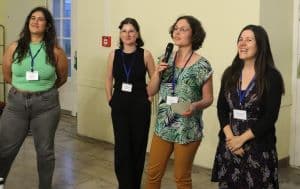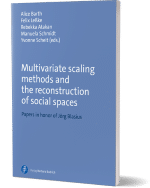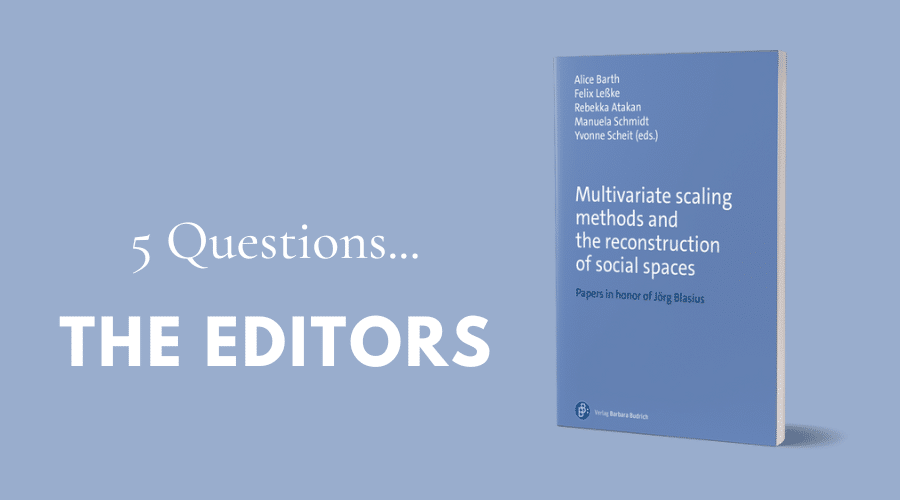5 questions answered by the editors of Multivariate scaling methods and the reconstruction of social spaces. Papers in honor of Jörg Blasius
About the book
This edited volume assembles contributions of leading scholars in the fields of statistical methods and applications in the social sciences. Multivariate scaling methods for categorical data, in particular correspondence analysis, are used to extract the most important dimensions from complex data tables and to visualize relationships in the data. The volume treats recent statistical developments, methodological considerations, and empirical applications. A special emphasis is placed on multiple aspects of space and their sociological significance: the reconstruction of “social spaces” with statistical methods, illustrations of spatial relations involving proximity, distance and inequality, and concrete interactions in urban neighbourhoods.
The edited volume is meant to honour the lifetime achievements of Prof. Jörg Blasius (Chair of Sociology/ Empirical Research Methods, Bonn).
You edited the anthology Multivariate scaling methods in honour of social scientist Jörg Blasius. Could you tell us a little more about the context of the volume?
At the occasion of Jörg Blasius’ retirement, we edited this volume to celebrate his remarkable scientific achievements and his prominent role in research networks on social science methods in general and correspondence analysis in particular. The volume features articles contributed by his many collaborators, who wrote about topics in which they have a common interest with Jörg Blasius.
What kind of questions, what kind of topics does the volume cover?
The volume covers a wide range of topics across four thematic areas. Firstly, it delves into the mathematical discussion of statistical properties of scaling methods for categorical data, exploring commonalities and differences between multiple correspondence analysis and principal component analysis and discussing methods of combinatorial inference in this methodological framework. Secondly, the volume features applications of these methods, e.g. for reconstructing the dimensions of a social network or exploring connections between health, working conditions in vocational training and socio-economic status. The third focus is on urban sociology, examining both social and physical space. For example, there is a fascinating contribution featuring a comparative analysis of eating and housing practices in Berlin, Singapore, and Nairobi. Lastly, the volume presents sociological perspectives on teaching statistics and concludes with the use of correspondence analysis for the assessment of the effects of a visual stimulus on rating scale use. In addition, we have assembled a number of personal greetings and reminiscences to Jörg Blasius.
To what extent are multivariate scaling methods particularly suitable for describing and reconstructing social spaces?
Scaling methods for categorical data, such as Multiple Correspondence Analysis (MCA), are particularly well suited for the analysis of social spaces due to their ability to analyze social structures within a relational framework. The interplay of socio-economic indicators, such as income, education, and wealth on the one hand, and preferences, attitudes and lifestyles on the other, can be analyzed with these methods in order to draw a comprehensive picture of the commonalities and distinctions within a certain society or a specific subsection. In the broader research tradition of geometric data analysis, a special emphasis is on the visualization of the results in a low-dimensional geometric space, thus making the “social space” directly visible.
Could you say something about current developments in multivariate scaling methods in the social sciences?
The scaling methods covered in our volume are predominantly designed for the analysis of categorical data, which is abundant in social science research. While these methods have been applied in research for several decades, current developments in software, data visualization and methodological refinement allow for ever fine-tuned analyses. One notable challenge that researchers are grappling with in the context of statistical methods is the increasing volume of big data, which necessitates the development of robust and efficient techniques to handle and analyze large datasets effectively.
Many of the themes and topics discussed in the anthology were presented at the 2023 CARME (Correspondence Analysis and Related Methods) conference in Bonn. On the one hand, this conference dealt with applications of correspondence analysis and related methods, most notably in the reconstruction of social spaces, following the tradition of scholars like Pierre Bourdieu. On the other hand, methodological innovations and the use of various forms of data, including digital and textual data, advances research in this area.
This is why we have chosen Barbara Budrich as our publishing partner
We selected Barbara Budrich as our publishing partner primarily because there is a longstanding working and personal relationship between her and Jörg Blasius, which made this collaboration a natural and fitting choice. In addition, both the opportunity to publish the book open access and the fact that the whole process of production is situated in Germany were arguments speaking for Barbara Budrich.
About the editors
Alice Barth works as a post-doc researcher at the Institute of Political Science and Sociology at the University of Bonn and currently leads a DFG-funded project on the analysis of neighborhood changes by means of a dwelling panel. Her main research interests are inequality and change in urban space, multivariate analysis methods, comparability of measurement instruments and relational sociological theories.
Felix Leßke is currently employed as an evaluator at the German Development Cooperation Evaluation Institute (DEval). Previously, he worked as a research assistant at the Universities of Bonn and Cologne. His research focuses on empirical social research, migration and integration research, relational sociological theory, and urban sociology.
Rebekka Atakan works as a PhD student in an DFG-funded project on the analysis of neighborhood changes by means of a dwelling panel. Her dissertation focuses on the perception of urban space, the construction of neighborhood images and the interplay of social and spatial inequality.
Yvonne Scheit works at the Department of Sociology at the University of Bonn. Having a background of both Cultural Anthropology and Sociology, she is interested in multivariate analysis, qualitative methods, grounded theory and mixed methods. Yvonne Scheit is currently researching about the students’ view of the digitalization process at the University of Bonn and the effects of the covid-19 pandemic on students’ lives and digital teaching.
Manuela Schmidt works as a research assistant for the DFG-funded project “The Cologne Dwelling Panel” and is a doctorate candidate of sociology at the University of Bonn. Her research interests include survey methodology, computational social science, and multivariate analysis methods.

The editors during the book presentation (without Felix Leßke)
Order now via our web shop (print + e-book)

Multivariate scaling methods and the reconstruction of social spaces
Papers in honor of Jörg Blasius
edited by Alice Barth, Felix Leßke, Rebekka Atakan, Manuela Schmidt and Yvonne Scheit

